#peter andrus
Explore tagged Tumblr posts
Text

Crowbar Salvation 1989 (photo: Paul DuGre)
youtube
youtube
#crowbar salvation#ace farren ford#marty nation#hermann senac#peter andrus#sympathy for the record industry#drew steele#Youtube
2 notes
·
View notes
Text

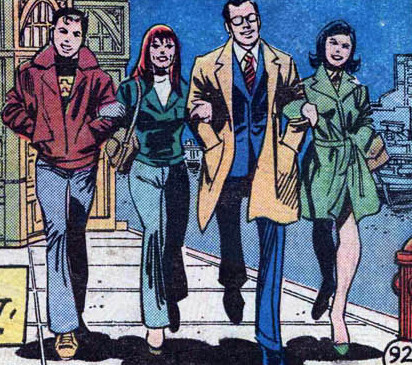
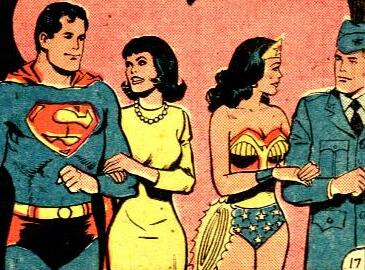

Lois & Clark double dates.
#superman#lois lane#clark kent#clois#batcat#wondertrev#spider man#mary jane#Batman#Catwoman#Wonder Woman#steve trevor#jimmy olsen#silver banshee#peter parker#bruce wayne#selina kyle#diana prince#siobhan mcdougal#Clay Mann#Ross Andru#kurt schaffenberger#jamal campbell#dc comics#marvel#art
74 notes
·
View notes
Text

Amazing Spider-Man (Vol. 1) #147 Writer: Gerry Conway, Pencils: Ross Andru
44 notes
·
View notes
Text



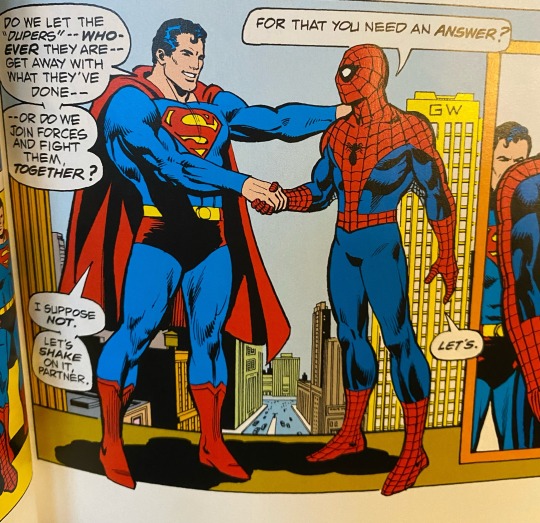



Spidey and Supes make comic book history.
#dc comics#dc heroes#marvel#superman#Spider-Man#peter parker#clark kent#Kal-El#man of steel#Spidey#mary jane watson#lois lane#lex luthor#doctor octopus#doc ock#otto octavius#ross andru#gerry conway#dick giordano#jerry serpe
11 notes
·
View notes
Text

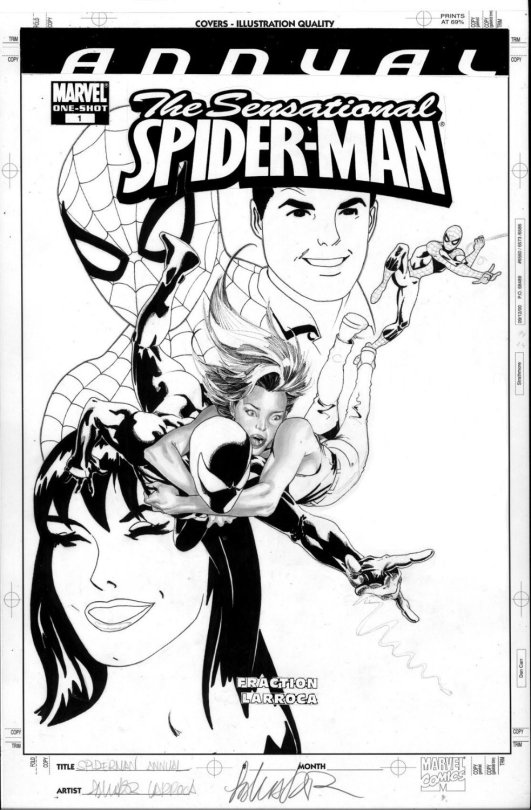
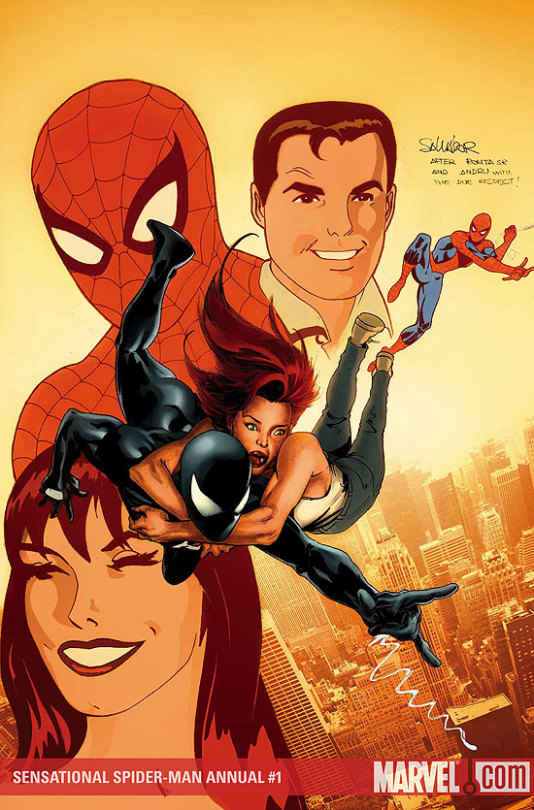

2007's Sensational Spider-Man Annual Vol.2 #1 cover by Salvador Larroca (both a tribute to John Romita Sr. and Ross Andru). When Fraction & Larroca (then the future Invincible Iron Man creative team) used this issue to say farewell to this married couple (several months before the start of the reviled "One More Day" story arc).
#spidey#spider man#sunset#melancolía#melancolic#peter parker#mary jane watson#marriage#spider marriage#2007#2000s#MJ#peter mj#couple#back in black#hommage#tribute#john romita senior#ross andru#sad#romantic#marvel comics#marvel#nick spencer is obviously a big fan of this annual#webhead#arachnids#black suit#cover#aesthetic#Spiderman 3
29 notes
·
View notes
Text

329 notes
·
View notes
Text

Amazing Spider-Man #176 (Wein/Andru, Jan 1978). If Aunt May’s activism isn’t giving Peter enough to worry about, Harry’s acting like a real yo-yo…
#marvel#marvel 616#amazing spider man#peter parker#spider man#harry osborn#green goblin#len wein#ross andru
51 notes
·
View notes
Text

“Some of the minor characters appear less often than Calvin and Hobbes, but, hopefully, over years, each one will become a unique personality that will be every bit as complex and interesting as Calvin and Hobbes,” (Bill Watterson, “The Bill Watterson Interview”).
Peter Parker was created by Stan Lee and Steve Ditko! Ben Reilly was, in a way, created by Gerry Conway, Ross Andru. (I’m honestly not sure who to credit for his revival during the Clone Saga, and if anyone has a good answer I’m happy to include it.)
#the mighty marvel super heroes#stan lee#steve ditko#gerry conway#ross andru#ben reilly#scarlet spider#mayday parker#spider girl#peter parker
37 notes
·
View notes
Text
When Spidey Jumped the Shark, Pt. 4: The Len Wein Era
Looking back at the Len Wein era of Spider-Man. #spiderman #marvel #LenWein
This should be a relatively quiet and easy post, particularly compared to the previous one in this series. Continue reading Untitled

View On WordPress
#1970s#bill mantlo#bronze age#chris claremont#comics#gerry conway#green goblin#john byrne#kingpin#len wein#marvel comics#marvel team-up#peter parker the spectacular spider-man#ross andru#sal buscema#spider-man#spidey super stories#Superheroes#web-slinger#webhead
4 notes
·
View notes
Text

https://www.etsy.com/.../marvel-team-up-vol-1-15-bronze... NEW TO THE SHOP. GD/VG Marvel Team-Up 15. First team up of Spider-Man and Ghost Rider. Available through the link for $15.00
#marvel team up#spider-man#ghost rider#peter parker#johnny blaze#the orb#gil kane#len wein#ross andru#marvel comics#comics#comic books#comics for sale
3 notes
·
View notes
Text

Ross Andru and Mike Esposito Amazing Spider-Man #185 Cover Original Art (Marvel, 1978) Source
1 note
·
View note
Text
Spider-Man Read-Through 026: The Liz' is back, back again (GSSM 3-6)
MASTERPOST
This batch features the Punisher, Gwen Stacy, aliens, and also...

...Doc Savage.
Are you lost? Me too!
I'm not familiar with Doc Savage, but he's a big figure of GSSM3! And newcomer Desinna (who never appeared again) too. What follows is a wild, wild tale and I'm at a complete loss over how to even handle it. Let's just say: aliens from a parallel dimension that's out of time.
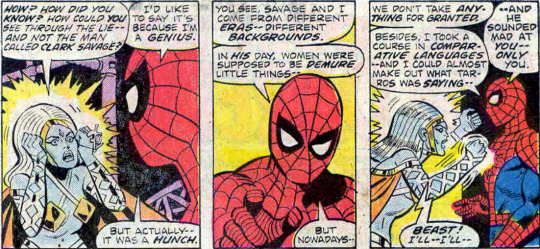
There's this funny bit where Peter pretends the women he knows aren't written like demure little things too.
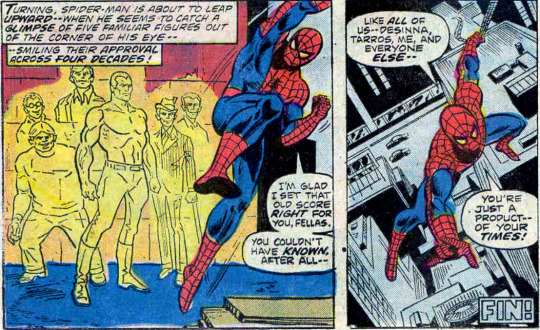
That sure is a conclusion. I'm staring wide-eyed at my monitor. I'm in shock.
...Let's go on to the next one.
GSSM #4 features the Punisher! He saves Spidey from a deadly bullet and once again shows him a stag movie. He asks Spidey to help him make a biochemical weapon go "poof". Sorry, I'm tired. Words. In the dictionary. Are being forgotten.
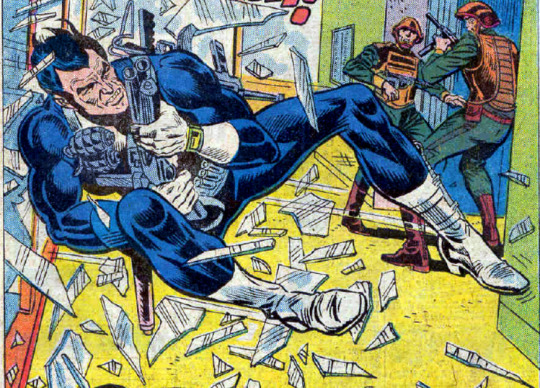
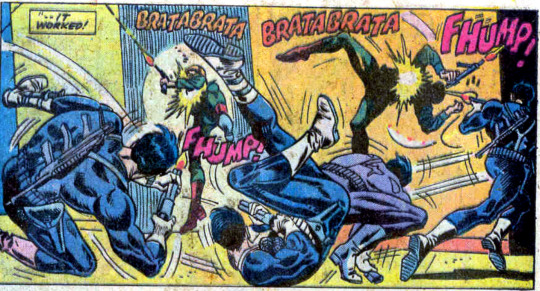
Frank Castle has not lost the art of sensational entrances, as you can see. We also get to see a nice page of Spidey infiltrating a building amidst falling snow. Snow always makes for nice visuals.

By the way, talking about snow, which is featured a lot in Tomb of Dracula, I'm only midway through 1973 in *that* series. Just an observation.
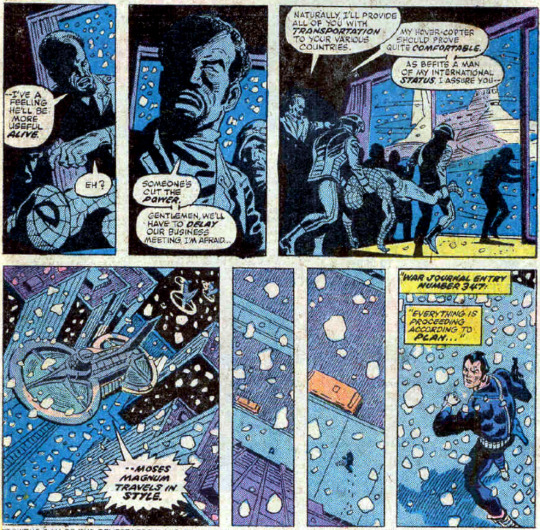
The pretty visuals continue. Can you tell I enjoy this issue more?
Spidey gets thrown in a death camp and makes jokes that actually made me snort:

But it turns out this isn't our Spidey! What?!
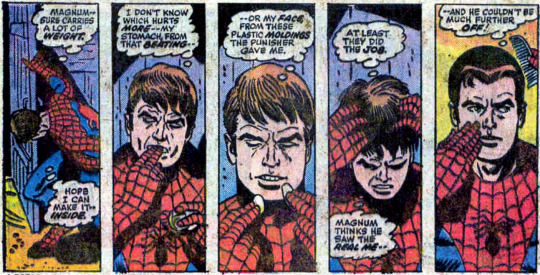
Oh. Okay. Gerry Conway likes his twists, huh?
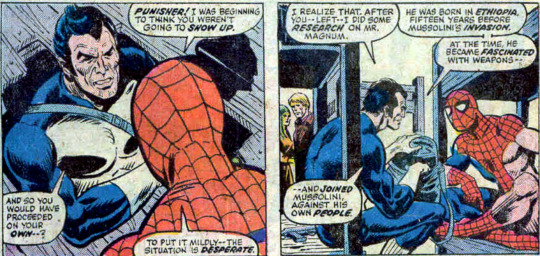
On the panel on the right, Spidey's momentarily missing a part of his costume with no explanation. I hate it when that happens!
They save the day and the Punisher more or less directly makes the antagonist melt in a poison gas.

Spidey's expression in the last panel is funny. I wish he discussed that just a bit more, because the Punisher already killed someone in the first few pages of the issue and I was surprised they didn't comment on it, but that last page makes up for it.
GSSM 5 time!
Gwen's back (although we know the truth is a tad more complicated), and Spidey wants to get away from all this drama. He hears about the Man-Thing wrecking havoc in Florida and immediately gets Jameson's approval and calls Dr. Connors.

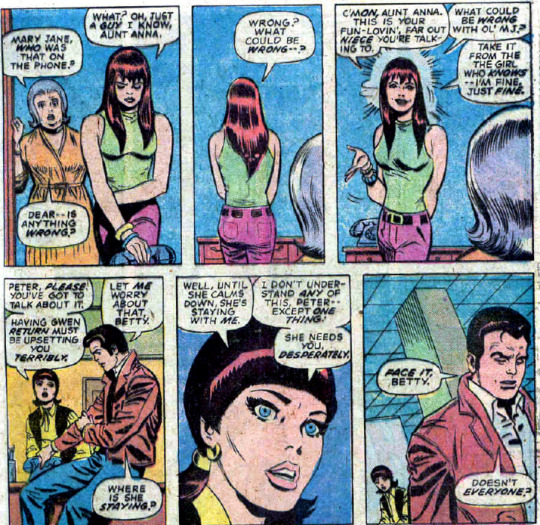

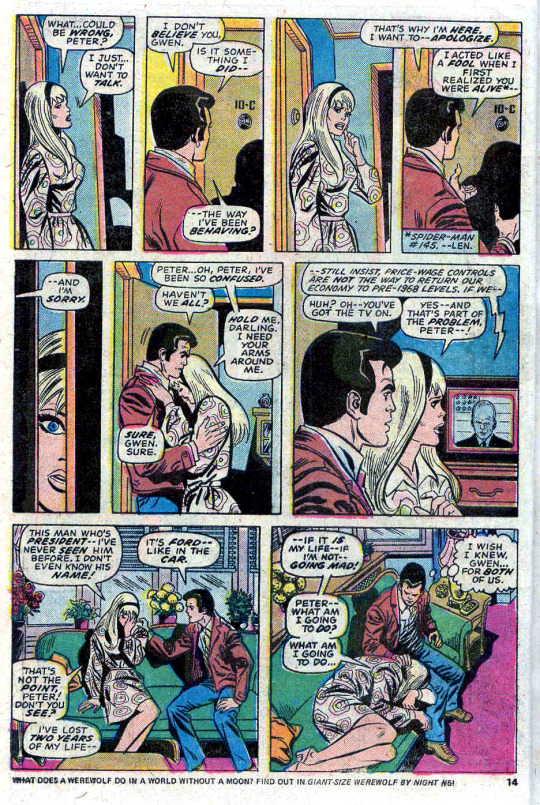
We finally get Peter crumbs, nice! And nice development for everybody. That's actually more than what I was expecting, I'm really happy.
Meanwhile, Connors gets back in his Lizard form and seeks the Man Thing. He finds him and they fight next to Arnstead, a guy who was previously contemplating ending it all. Gerry Conway didn't hesitate to touch complicated subjects, huh.
Spidey and the Lizard's fight is neat, and our hero gets help from Connors's wife!

Naturally, the Man Thing quickly intervenes as well and we get furry bondage. It makes me... feel... absolutely nothing. What the fuck, Ross Andru.
*Ahem* Anyway, Arnstead figures out from Connors's notes how to make an antidote and all's well that ends well. That was a neat issue and I particularly appreciated the soap side.
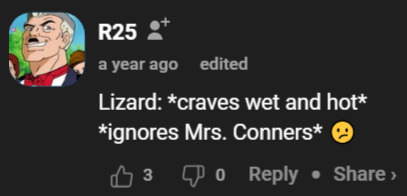
...I'll admit I had the same joke in mind.
Last one for tonight, GSSM 6! But it's actually a reprint of Annual 4, which I've reviewed here. I definitely recommend it (as seen here).
What's next in store:
a new regular writer, Len Wein
the Shocker
a coda to the first Clone Saga
See you there!
0 notes
Text
Marvel Team-Up #1 ‘Have Yourself a Sandman Little Christmas!’ (1971) by Roy Thomas, Ross Andru and Mike Esposito. Edited by Stan Lee. Cover by Gil Kane and Frank Giacoia.

#marvel team-up#spider-man#peter parker#the human torch#johnny storm#marvel#roy thomas#ross andru#mike esposito#stan lee#gil kane#frank giacoia#comics
36 notes
·
View notes
Text

Amazing Spider-Man (Vol. 1) #147 Writer: Gerry Conway, Pencils: Ross Andru
32 notes
·
View notes
Text
Dorothy's Big List of Comic Book Recs - Marvel Comics Edition
I often get asks about getting into comic books, and how daunting it seems, given the huge back catalog of titles and issues available. I'm here to tell you it doesn't have to be scary! From miniseries that act as good introductions to characters to runs on ongoing titles by individual creators that serve on jumping-on points, there's lots of ways to get into comics without having to have a lot of background knowledge, and I'm going to give you a lot of potential places to start. Please note that this post only covers Marvel Comics; this is a companion to my DC list and I will also have a list for indie comics and smaller companies at some point. Also note that I haven't read everything, and I won't recommend something I haven't read, so a few runs or books some consider must-reads may not be on here. This is based purely on books I have read and enjoy, and that I think are suitable for new readers.
SPIDER-MAN
The Amazing Spider-Man (1963) by Stan Lee, with artists Steve Ditko and John Romita, Sr.: The classic Spider-Man stories which laid the foundation for the character. These stories are filled with the melodrama and pathos that really makes Spider-Man shine, and with two of the greatest artists of the Silver Age on deck, you really can't go wrong. Ditko stays on the book until issue 38, and Lee's run ends at issue 110.
The Amazing Spider-Man (1963) by Gerry Conway, with artists John Romita, Sr., Gil Kane, and Ross Andru: Picking up immediately after the end of Stan Lee's run, Gerry Conway wrote issues 111 to 149. This run includes a number of vital Spider-Man stories, including Spidey's climactic tussle with the Green Goblin and his first brush with the nightmares of cloning.
The Amazing Spider-Man (1963) by Roger Stern: Spanning issues 229 to 252, this brief but memorable run includes several iconic Spider-Man stories and the debut of the Hobgoblin.
The Amazing Spider-Man (1963) by Tom DeFalco and Ron Frenz: DeFalco wrote the book from 253 to 285, and this run included the debut of Silver Sable as well as Spider-Man's black suit.
The Amazing Spider-Man (1963) by J. Michael Straczynski: This should be read in omnibus format as the numbering is a little weird; the run starts during volume 2 of Amazing but the book switched back to volume 1 and original numbering partway through. One of my favorite runs on the book! The creator of Babylon 5 brings Peter Parker into the 21st century, giving him a job as a science teacher and first hinting there might be some destiny at play in how he got his powers. There are a few warts on this run, however, mainly due to editorial mandates: it contains the dreadful "Sins Past" storyline and it ends on the wet fart that is "One More Day."
Peter Parker, the Spectacular Spider-Man (1976) by Bill Mantlo and Al Milgrom: The sister book to Amazing often goes a little overlooked, but this is a great run on it, including one of the best Doctor Octopus stories in Spider-Man history.
Peter Parker, the Spectacular Spider-Man (2017) by Chip Zdarsky: Spectacular was brought back in 2017 with writer Chip Zdarsky at the helm, and it's great. The standout story is probably issue 6, "My Dinner with Jonah," which is one of my favorite Spider-Man issues ever.
Spectacular Spider-Man (1988) by J.M. DeMatteis and Sal Buscema: This run spans issues 178 to 203, and includes Spider-Man's final battle with the second Green Goblin, the standout storyline of the run. DeMatteis also had a turn writing Amazing, but I wouldn't wish the Clone Saga on any new reader.
Spider-Girl (1998) by Tom DeFalco and Ron Frenz: An alternate universe title set in the future and starring the daughter of Peter Parker and Mary Jane, it's great superhero fun featuring everything that made classic Spider-Man great.
Ultimate Spider-Man (2000) by Brian Michael Bendis and Mark Bagley: Another alternate universe book which sought to reintroduce Spider-Man to a new generation. It's a solid book and a good read, but it is very dated to the 2000s for good and for ill.
Ultimate Spider-Man (2023) by Jonathan Hickman: Another alternate-universe take on Spider-Man, this time reimagining him as a family man who gets his powers in his 30s. Whereas most Spider-Man takes start Peter off as a kid with power but no responsibility, this flips the script by having him as an adult with responsibility but no power, as he finds himself drafted into a war against the forces that have taken control of the world.
Miles Morales: Spider-Man (2019) by Saladin Ahmed: Hot off the heels of Into the Spider-Verse, Ahmed's run on Miles' title pushes him forward and secures his place as a leading light of the Marvel Universe, and even gives him his own Clone Saga.
Miles Morales: Spider-Man (2022) by Cody Ziglar: This title is ongoing, but it's a great read that continues the work of carving out Miles' niche in the Marvel Universe and taking him in new directions.
Spider-Man: Life Story (2019) by Chip Zdarsky and Mark Bagley: A thoughtful and heartfelt story that takes Peter Parker on a real-time adventure through the decades, beginning in the 1960s.
Spider-Man 2099 (1992) by Peter David: A cyberpunk romp through a futuristic New York, featuring corporate oppression and intrigue. Miguel O'Hara's best run as Spider-Man.
X-MEN
X-Men (1963) by Stan Lee and Jack Kirby: The initial run of the X-Men lays the groundwork for everything to come, but the book didn't sell well or retain Stan's attention the way Spider-Man or the Fantastic Four could, and he left the book after issue 19. Roy Thomas took over for the rest of the 60s, and there's some good stories in there too, but the real great stuff was still to come.
X-Men by Chris Claremont: MUST be read in omnibus format, because this mammoth run spanned over a decade and a half, including multiple titles - not only the main X-Men book but the New Mutants and the stellar graphic novel "God Loves, Man Kills." THE definitive X-Men run, featuring most of the team's most iconic stories.
New X-Men (2001) by Grant Morrison: Not my favorite work by Morrison, but this is probably the most important run after Claremont. Morrison brings a more militant spirit and a focus on radical activism to the X-Men, and the run opens with a bang - though I have to admit that it closes with two of my least favorite X-Men stories.
X-Men (1991) by Mike Carey: Fun stories featuring an eclectic assortment of characters and interesting team dynamics, but the real treat comes when the book becomes X-Men: Legacy, and a character study on Professor X and his son Legion.
New X-Men (2004): Of course, a classic element of X-Men stories is the school setting, and this book brings that concept into the 2000s, focusing on students at the Xavier School and their interpersonal drama. Degrassi with superpowers.
Wolverine and the X-Men (2011) by Jason Aaron: Another school-set book, this one focuses on Wolverine's efforts to run a school filled with mutant teenagers.
X-Factor (1986) by Louise and Walter Simonson: A very 80s team book focusing on the original X-Men, reconnecting after several years apart, and the conflicts they get drawn into, often the result of their own mistakes. Also features the debut of Apocalypse, one of the best X-villains.
X-Factor (1986) by Peter David: After David took over the book, the focus of X-Factor was shifted from being the original X-Men to an oddball group of government-sanctioned mutants. This book also helped flesh out the character of Mystique.
X-Factor (2006) by Peter David: X-Factor returned under David in the 2000s, this time as a detective agency specializing in cases involving mutants. There's a cynical edge to this book which was common in the 2000s but it really works for this title.
X-Force (1991) issues 116 to 129 and X-Statix by Peter Milligan and Mike Allred: Allred's art is worth the price of admission. Imagine a team where every character is expendable, most of them are liable to die in really nasty ways, and they all have weird and uncomfortable powers. That's X-Statix.
Ultimate X-Men (2024) by Peach Momoko: Probably my favorite of the new Ultimate line. Very different vibes to basically any other X-Men book - this one is essentially a horror manga in the vein of Junji Ito or Shigeru Mizuki.
THE HULK
Hulk: Gray by Jeph Loeb and Tim Sale: A moody and gorgeously-illustrated take on the Hulk's earliest days.
The Incredible Hulk (1962) by Bill Mantlo and Sal Buscema: Buscema is one of the best Hulk artists of all time, and while Mantlo's writing can be hit or miss, when he hits he really hits, as in issue 312, one of the best Hulk issues ever written.
The Incredible Hulk (1962) by Peter David: David's run is considered the definitive Hulk run, and for good reason. It is best read in omnibus format because it is very long, and packs a lot into that long tenure. Bruce Banner's Joe Fixit alter debuts here, as does his Professor persona.
The Incredible Hulk (2000) by Greg Pak: This run includes the Planet Hulk storyline! Exiled from Earth, the Hulk rises to power as a warlord on a hostile alien world. Really scratches that Conan the Barbarian itch.
The Indestructible Hulk (2013): A different take on the Hulk, this time recasting him as an agent of SHIELD with all the adventures and difficulties that brings.
The Immortal Hulk (2018) by Al Ewing: Here we see the difference between "definitive" and "best." While David's run is the definitive Hulk run, for my money Immortal Hulk is the best. It is both a gnarly piece of body horror and a deeply thoughtful title that muses on the nature of anger, of suffering, and of pain, drawing heavily on Kabbalistic imagery and themes.
She-Hulk (2004 and 2005) by Dan Slott: An offbeat workplace comedy set in a law office specializing in cases involving superhumans. The best She-Hulk run in my book, not least because it does not involve John Byrne.
DAREDEVIL AND STREET LEVEL STUFF
Daredevil (1964) by Frank Miller: Probably the definitive Daredevil run, and the only time I've been able to stand Frank Miller, this run features some great art as well as some of the most important Daredevil stories in the character's history.
Daredevil (1964) by Ann Nocenti: Carries on from the Miller run and takes the character of Daredevil, his supporting cast, and Hell's Kitchen in some totally new directions. Includes the story of the excellent villain Typhoid Mary.
Daredevil (1998) by Brian Michael Bendis: A gritty, very 2000s take on Daredevil, Bendis' strengths as a writer are on full display during this run, with grungy art to match.
Daredevil (2011 and 2014) by Mark Waid: A much lighter and more superhero-y run than Daredevil often gets, this excellent run features Matt going up against criminal syndicates, old enemies coming back for revenge, and more.
Hawkeye (2012) by Matt Fraction: Easily the best book Hawkeye has ever had. Spectacular art and excellent scripting featuring both Clint Barton and Kate Bishop in a firmly street-level narrative focusing on threats to the local community.
The Punisher (2011) by Greg Rucka: For my money the best the Punisher (whom I usually don't like) has ever been. A genuinely thoughtful examination of Frank Castle as a human. Many people swear by the Garth Ennis run on the character, but to me this is the definitive Punisher run.
Mockingbird (2016) by Chelsea Cain: A short but fun series focusing on Mockingbird in a number of spy thriller scenarios.
Alias (2001) by Brian Michael Bendis: A mature mystery series starring a former superheroine. It goes into some gnarly territory but it really displays Bendis' strengths in writing street-level, grounded stories within the Marvel Universe.
Moon Knight (1980) by Doug Moench: Moon Knight fans will be mad that this is the only run I have on this list but it's the only one I've read! It's a fantastic read though.
Ms. Marvel (2014 and 2016) by G. Willow Wilson: There's a reason that Kamala Khan has been one of Marvel's biggest breakout characters in recent history, and it all starts in this initial run of comics. Great art and fantastic scripts by Wilson.
Runaways (2004 and 2005) by Brian K. Vaughan: One of my favorite setups in a comic, with a group of teenagers learning that their parents are actually a supervillainous cabal and running away from home in response. Great teen drama with a superpowered twist. The second volume also has a run by Joss Whedon (bear with me) that's also pretty good.
TEAMS AND TEAM-UPS
Fantastic Four (1961) by Stan Lee and Jack Kirby: One of the greatest comic books ever written. Both Lee and Kirby poured their heart and soul into these early adventures, and you can really tell. The first Galactus story is still one of my favorites. Essential reading.
Fantastic Four (1998) by Mark Waid and Mike Wieringo: Probably my favorite Fantastic Four run, with a great focus on Doctor Doom, Mister Fantastic, and Ben Grimm.
Fantastic Four (2022) by Ryan North: The current FF run, this one goes all-out on wacky science fiction adventure, with most stories only taking one or two issues to tell. Bite-size superhero fun, with fantastic characterization. Made me stan Alicia Masters.
The Avengers (1963) by Roy Thomas: The initial run of the Avengers by Lee, Kirby, and Heck, is serviceable, but the team came into their own under Roy Thomas, who introduced mainstays of the team like Vision and Black Panther to the roster, in this run which also incldues the classic "Kree-Skrull War" storyline. Throw in art by legends like John Buscema, Sal Buscema, and Neal Adams, and you've got a great run to get into the Avengers with.
The Avengers (1963) by Roger Stern: Another great Avengers run, this one solidified a roster for the team which included members like Hercules, Black Knight, and the best Captain Marvel aka Monica Rambeau, and includes the best "Avengers Mansion is attacked" story.
The Avengers (1997) by Kurt Buseik and George Perez: A creative dream team relaunched the Avengers in the late 90s to fantastic effect, with several excellent storylines and gorgeous art. This is, for my money, the definitive Avengers run.
Young Avengers (2013) by Kieron Gillan: The Young Avengers have mostly been supplanted as Marvel's premiere team of teenage superheroes, but this is their best book in my view, featuring the team's best roster and some of their best stories.
Champions (2016) by Mark Waid and Humberto Ramos: A great teen team book, the Champions have basically replaced the Young Avengers in no small part due to this run. Makes me yearn for a Waid-penned Teen Titans ongoing.
Defenders (1972): I'm just gonna recommend the whole comic. If you want off-beat and unusual superhero team dynamics and out-there storytelling, this is a good bet. Special attention should go to Steve Gerber's run around issue 20 or so.
MAGIC MARVEL
Doctor Strange: The Oath (2006) by Brian K. Vaughn and Marcos Martin: A good entry point to Doctor Strange and his weird world, featuring some really great art.
Strange Tales (1951) by Stan Lee and Steve Ditko: Never has Steve Ditko's art been better than in those first Doctor Strange stories, weird and wonderful and surreal.
Journey Into Mystery (1951) and Thor (1966) by Stan Lee and Jack Kirby: The first Thor stories are not only great, they feature Kirby's excellent Tales of Asgard backups which he would eventually develop into his Fourth World at DC.
Thor by Jason Aaron: Read in omnibus format. A true epic worthy of Norse legend. Includes some all-time great Thor stories.
The Immortal Thor (2023) by Al Ewing: The current Thor run, with a strong focus on mythology and how stories are constructed and passed down across the years.
Scarlet Witch (2023 and 2024) by Steve Orlando: A fun ongoing that finally made Wanda Maximoff a worthy headliner in Marvel, featuring her protecting a small town from magical threats.
COSMIC MARVEL
Silver Surfer (1968) by Stan Lee and John Buscema: One of my favorite comics as a teenager, this book combines space opera and melodrama to great effect.
Silver Surfer (1987) by Steve Englehart, Jim Starlin, and Ron Marz: The definitive Silver Surfer run. Includes some excellent stories, including some from the master of cosmic Marvel, Jim Starlin.
Silver Surfer (1988) by Stan Lee and Moebius: Must be read for the art alone.
Guardians of the Galaxy (2008) by Dan Abnett and Andy Lanning: This is where the MCU team originated, and it's still the best run the Guardians have ever had.
Quasar (1989) by Mark Gruenwald: Has the energy of a Silver Age comic with none of the baggage. Definition of a hidden gem.
Nova (2007) by San Abnett and Andy Lanning: Probably the definitive Nova run? Spun out of Annihilation which as an event comic I haven't included here but is still a great read.
Eternals (1976) by Jack Kirby: It's kind of Fourth World backwash, but it's Kirby doing wacky cosmic stuff so you know it's a good time.
AND THE REST
Power Pack (1984): What if a bunch of kids got superpowers? No, not teenagers, little kids? It's a thoroughly 1980s premise and one that shines best in the original series from that era.
Captain America (2005, 2011) by Ed Brubaker: A high-octane action-spy thriller which reintroduced Bucky and made him Cap for a while. The definitive modern Captain America run.
2001: A Space Odyssey (1976): A short adaptation of the novel and film, and then like 10 issues of wacky Kirby sci-fi. Really great hidden gem.
Black Panther (1998) by Christopher Priest: The definitive Black Panther run, that set the stage for everything to follow.
Black Panther (2016) by Ta-Nehisi Coates: Another great run exploring the nature of power. Many comic fans do not like it because they are philistines.
Vision (2015) by Tom King and Gabriel Hernandez Walla: Tom King is hit or miss, but this book is great, with the Vision building a family - of a kind - for himself.
25 notes
·
View notes
Text
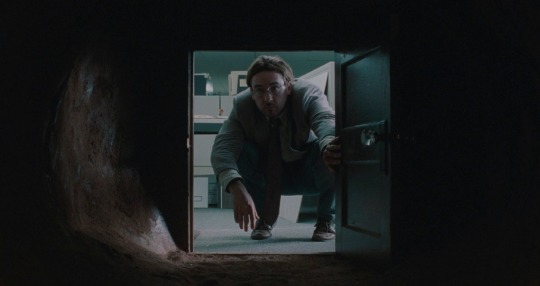




Being John Malkovich (1999)
Director: Spike Jonze DOP: Lance Acord Production Design: K.K. Barrett Art Direction: Peter Andrus
#cinematography#film stills#movie stills#being john malkovich#spike jonze#john cusack#cameron diaz#catherine keener#john malkovich
194 notes
·
View notes